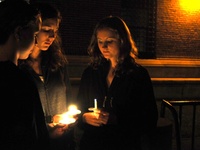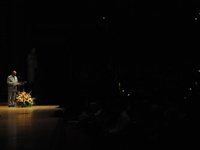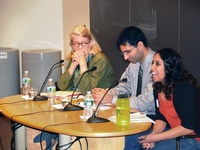
Reshma Lutfeali, Daryush Mehta, and Diana L. Eck speak on a panel at "Interfaith Conversations" on the 10th anniversary of 9/11.
As attendees bowed their heads in a moment of silence at a prayer vigil Sunday night, a plane roared by overhead. The sound of jet engines provided a haunting reminder of the terrorist attacks that a crowd of several hundred people had gathered to commemorate in Tercentenary Theater.
With the columns of Memorial Church illuminated in blue lighting, students gathered before its steps holding lit candles and listening to the testimonies and reflections of Harvard students and faculty members. The University Choir sang several hymns, and the Kuumba Singers opened the program.
“This event allowed us to realize that our borders are just dotted lines,” Professor of Comparative Religion Diana L. Eck said. “There is no strength in bricks and stone, but only strength in the relationships that we build.”
During a series of events Sunday, the University commemorated the terrorist attacks of September 11, 2001, mirroring similar events around the country as it remembered a day that has become a defining moment of the past decade.
In a sermon at Memorial Church that began the day’s events, Harvard Kennedy School Professor David R. Gergen encouraged a renewed sense of compassion in America in spite of a decade characterized by wars, economic shock, and “political lunacy.”
“We have entered a dark wood, as Dante would call it, and we are yet to see the light,” he said.
ith standing room only, the service drew a crowd of both regular churchgoers and other members of the Harvard community.
After September 11, 2001, Americans sought to embrace their own families—but Gergen argued that in the future Americans should demonstrate their compassion by seeking to embrace a broader community. Social challenges such as rampant unemployment and economic inequality often escape the discussion at religious centers, Gergen added.
“These are challenges we talk about in classrooms around Harvard,” he said. “But do we talk about them enough at Memorial Church?”
Considering how America should move forward in the next decade, Gergen said that compassion for one another will be essential.
“The larger threat comes from what we are allowing to happen to each other,” he said.
At the Harvard Interfaith Collaborative and Harvard Chaplains’ “Conversations on the 10th Anniversary of 9/11” event later in the day, students and religious officials agreed that Americans still have a long way to go in aftermath of 9/11.
“We are still talking in terms of a very polarized world—and of ‘us’ and ‘them,’” said Samir Selmanovic, the founder of the inter-religious community “Faith House Manhattan” and the event’s keynote speaker.
In the “post-post 9/11” world, Selmanovic said that Americans need to change the nature of current discourse about the attacks.
“A lot of interfaith discussion has been about the past instead of looking to the future and actually providing some kind of prototype or some ideas or new experiences—a new history that we can refer to,” Selmanovic said. “We want forward-looking people to have new stories.”
Read more in News
A Generation Without a WarRecommended Articles
-
Harvard Alum Accused of ArsonA recent Harvard Law School graduate has been accused of setting fire to a New York City chapel that houses ...
-
The Non Sequitur WarWhether the goal is defending American security or improving the lives of Afghans, occupying Afghanistan is a wasteful way to meet our objectives.
-
Moscow Bombing Reawakens FearsIn the wake of an explosion in Moscow’s Domodedovo Airport yesterday that killed an estimated 35 people and injured 180 others, some Russian students and experts at Harvard recalled the ongoing violence that has plagued Russia.
-
Harvard Business School Studies Mumbai HeroicsHBS Professor Rohit Deshpande will soon make public his recent documentary-style case study on the bravery and sacrifice of Taj Mahal Palace and Tower hotel employees during the 2008 Mumbai terrorist attacks.
-
 At IOP, Officials Reflect on Post-9/11 World
At IOP, Officials Reflect on Post-9/11 World -
Americans Reflect On Legacy of 9/11 AttacksAcross the country, Americans gathered to remember the tenth anniversary of the terrorist attacks of September 11, 2001
















